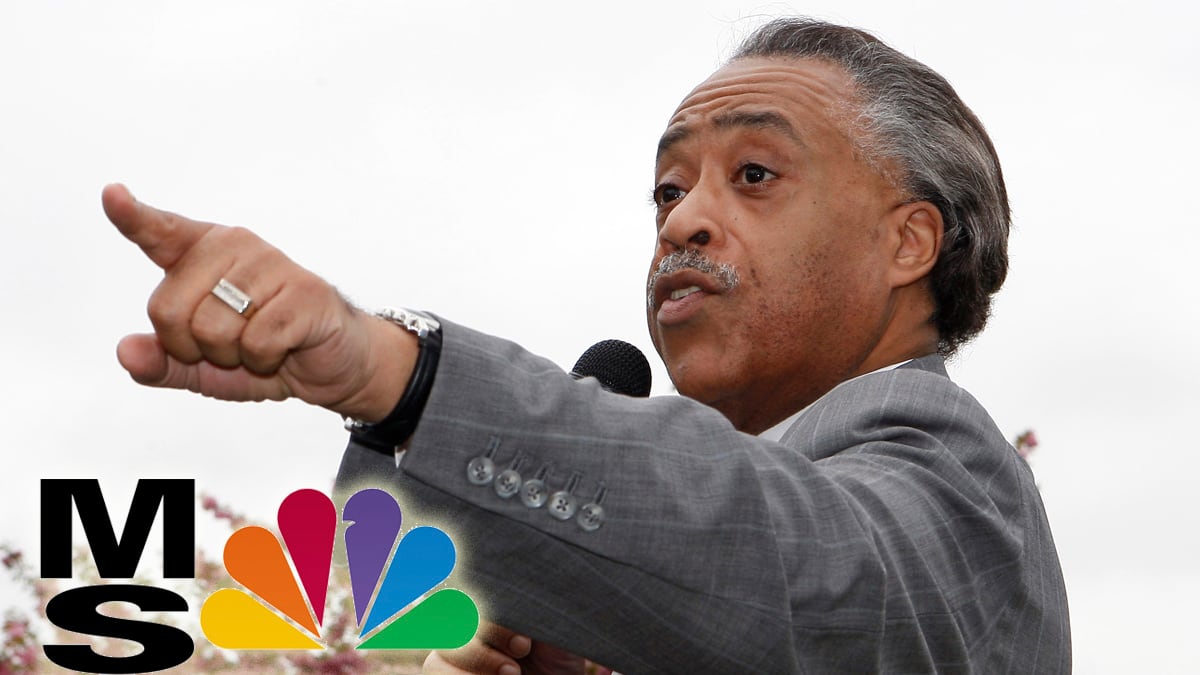Eight months after Al Sharpton signed a pivotal agreement that helped Comcast and NBC secure Federal Communications Commission approval for their $30 billion merger, MSNBC appears poised to reward him with a prime-time news show. While Sharpton is a soundbite success and entertaining TV guest, his three prior attempts at hosting a show have flopped badly, with the most recent, his ballyhooed Education SuperHighway, dying after a single episode last fall. His anchor forays in 2004 and 2005—I Hate My Job and Sharp Talk—ended after seven and 12 episodes respectively, while his 2004 presidential-campaign performance was so widely seen as vacuous and uninformed that it earned him remarkably puny support, even among black voters. In fact, until recently, Sharpton has been a Fox favorite, schmoozing with Bill O’Reilly and Sean Hannity 16 times in recent years, while appearing on Keith Olbermann’s old show only once.
Yet he has now been tapped to displace Cenk Uygur as the anchor of the 6 p.m. show MSNBC Live. In a mystified farewell address last Wednesday, Uygur pointed to a dramatic uptick in his internal ratings for April, May, and June, when his show apparently ranked second overall in total viewers and even exceeded Fox in an 18-to-34 demographic in June, noting that MSNBC had offered him a substantial pay package to do weekend shows and that he had declined. (An NBC spokesman declined to discuss ratings or anything else with us, noting only that “there is no agreement” with Sharpton to host a program “at this time,” though The New York Times and many other news organizations have reported it.)
Sharpton has a long and well-documented history of leveraging his civil-rights profile for his own benefit. Grabbing a prime-time anchor spot in exchange for cheerleading for a controversial merger would be the capper on that career. It’s gone remarkably unnoticed that Sharpton was the first major black leader to endorse the Comcast merger, which met fierce resistance. Michael Copps, a Democrat who’d served on the FCC since 2001, declared, when he ultimately voted against it, that the merger “erodes diversity, localism and competition” and was “a huge boost for media industry (and digital industry) consolidation” as well as “a stake in the heart of independent content production,” charges that were echoed in a New York Times editorial. But Mignon Clyburn, the daughter of South Carolina Congressman James Clyburn and the only minority member on the FCC, threw her decisive support behind the deal, citing a comprehensive diversity memorandum of agreement (MOU) signed by Sharpton as a mechanism that “will serve to keep the new entity honest in promoting diversity.”
Without Clyburn, FCC chair Julius Genachowski, the third Democrat on the commission, seems unlikely to have backed the deal, which he did a week after the MOU was sent to the FCC. The MOU was significant because it countered opposition from Jesse Jackson, a variety of black organizations, and some black House Democrats. The then House Judiciary chair, John Conyers, convened combustible hearings last summer in Chicago and Los Angeles, and California Rep. Maxine Waters declared at one that she wasn’t interested in hearing how much Comcast had given to "the NAACP, Al Sharpton, and the Urban League,” the three entities that eventually signed the MOU. (Just a couple of weeks before the MOU was sent to the FCC, Sharpton aggressively championed James Clyburn in his post-election fight to retain his leadership position in the House, while Comcast contributed $10,500 to Clyburn’s political committees. Mignon Clyburn, who is reported to have met with Sharpton, declined to respond to Beast questions.)
A Comcast spokesperson told The Daily Beast that Comcast has given $140,000 to Sharpton’s National Action Network since 2009—the same year the merger was first proposed. Though MSNBC president Phil Griffin was honored with a top prize at the April 2011 annual conference of NAN—and he, Chris Mathews, and other NBC notables had a table at NAN’s dinner—NBC would not answer questions about how much it's given Sharpton. Comcast also insisted in an email to The Daily Beast that the company “pledged we would not interfere” with NBC news operations, and “we have not and we will not,” a response similar to the only answer we got from NBC. Neither, however, directly answered the question of whether there was any connection between Sharpton’s merger role and his anticipated selection for the show.

Comcast spent more than $100 million on the merger in 2010, most of it on lobbying, and its decision to hire one of the Republican FCC commissioners, Meredith Baker, three months after she voted for the merger has already stirred one media uproar. Now it appears to be rewarding Sharpton, the only one of the three MOU signatories (the others were Marc Morial and Benjamin Jealous) to endorse the merger seven months before the MOU was signed, writing a May 2010 letter to the FCC backing it even before the company had made any written minority commitments.
The MOU required Comcast/NBC to establish minority advisory councils, and the Urban League’s Morial was named to chair the African-American panel. Sharpton’s organization designated the Rev. W. Franklyn Richardson, who has chaired NAN’s board for years, to sit on the council. Since Sharpton has frequently put himself on corporate councils, including even Walmart’s, his decision to appoint Richardson suggests that, as far back as May, he was already angling for an MSNBC job, and knew he couldn’t be both a council member and an employee.
The advisory council met for the first time with Comcast brass in May, but the company says the meeting was confidential, although the MOU itself says its proceedings will be “nonconfidential.” Comcast also refuses to release the benchmark study and the master strategic plan it was supposed to develop to implement the MOU promises about diversity, though the agreement says nothing about these documents being confidential. The original memo does specify that employment and procurement progress is confidential, which means that no one will be able to determine whether Comcast’s many promises are being kept.
That’s why the frequently frowning face of Sharpton on MSNBC prime time may be all we’ll know about Comcast/NBC’s compliance with its affirmative-action commitments.
Jacob Albert, Bill Kline, Lenina Mortimer, and John Surico contributed reporting for this piece.






